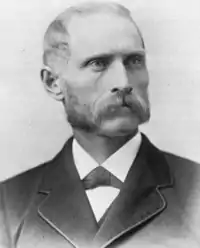Samuel Garman | |
|---|---|
 | |
| Born | June 5, 1843 Indiana County, Pennsylvania, United States |
| Died | September 30, 1927 (aged 84)[1] |
| Spouse | Florence Armstrong (m.1895) |
| Scientific career | |
| Fields | Zoology |
Samuel Walton Garman (June 5, 1843 – September 30, 1927), or "Garmann" as he sometimes styled himself,[2] was an American naturalist and zoologist. He became noted as an ichthyologist and herpetologist.[2]
Biography
Garman was born in Indiana County, Pennsylvania, on 5 June 1843. In 1868 he joined an expedition to the American West with John Wesley Powell. He graduated from the Illinois State Normal University in 1870, and for the following year was principal of the Mississippi State Normal School. In 1871, he became professor of natural sciences in Ferry Hall Seminary, Lake Forest, Illinois, and a year later became a special pupil of Louis Agassiz.[3] He was a friend and regular correspondent of the naturalist Edward Drinker Cope, and in 1872 accompanied him on a fossil hunting trip to Wyoming. In 1870 he became assistant director of herpetology and ichthyology at Harvard's Museum of Comparative Zoology. His work was mostly in the classification of fish, especially sharks, but also included reptiles and amphibians. Harvard College awarded him honorary degrees for his scientific work, B.S. in 1898 and A.M. in 1899.[2]
Personal
While working at Harvard, he lived in Arlington Heights, Massachusetts. In 1895, he married Florence Armstrong of Saint John, New Brunswick. They had a daughter.
Taxon described by him
- See Category:Taxa named by Samuel Garman
Taxon named in his honor
- Garman is commemorated in the scientific name of a species of Jamaican lizard, Anolis garmani.[4]
- The Rosette skate Leucoraja garmani (Whitley, 1939) is named after him.[5]
- Diaphus garmani, the Garman's lanternfish, is a species of lanternfish found worldwide.[6]
Publications (selected)
- Garman, Samuel (1883). On the reptiles and Batrachians of North America. Kentucky Geological Survey. doi:10.5962/bhl.title.10754.
- Garman, Samuel (1887). On West Indian Iguanidae and on West Indian Scincidae. Bulletin of the Essex Institute. Vol. 19. doi:10.5962/bhl.title.11968.
- Garman, Samuel (1890). The "Gila Monster". Bulletin of the Essex Institute. Vol. 22. doi:10.5962/bhl.title.12632.
- Garman, Samuel (1892). The Discoboli. Cyclopteridæ, Liparopsidæ, and Liparididæ. Memoirs of the Museum of Comparative Zoology. Vol. 14. Cambridge, Massachusetts: Museum of Comparative Zoology at Harvard College. doi:10.5962/bhl.title.13817.
- Garman, Samuel (1895). The Cyprinodont. Memoirs of the Museum of Comparative Zoology. Vol. 19. Cambridge, Massachusetts: Museum of Comparative Zoology at Harvard College. doi:10.5962/bhl.title.48520.
- Garman, Samuel (1911). The Chismopnea (chimaeroids). Memoirs of the Museum of Comparative Zoology. Vol. 40. Cambridge, Massachusetts: Museum of Comparative Zoology at Harvard College. doi:10.5962/bhl.title.49087.
- Garman, Samuel (1913). The Plagiostomia (Sharks, skates, and rays). Memoirs of the Museum of Comparative Zoology. Vol. 36. Cambridge, Massachusetts: Museum of Comparative Zoology at Harvard College. doi:10.5962/bhl.title.43732.
- Garman, Samuel (1917). The Galapagos tortoises. Memoirs of the Museum of Comparative Zoology. Vol. 30. Cambridge, Massachusetts: Museum of Comparative Zoology at Harvard College. doi:10.5962/bhl.title.41524.
References
- ↑ Clark, Hubert Lyman (1931). "Garman, Samuel". Dictionary of American Biography. New York: Charles Scribner's Sons.
- 1 2 3 Adler, Kraig (1989). Contributions to the History of Herpetology. Society for the Study of Amphibians and Reptiles. p. 61. ISBN 978-0-916984-19-9.
- ↑ One or more of the preceding sentences incorporates text from a publication now in the public domain: Wilson, J. G.; Fiske, J., eds. (1900). . Appletons' Cyclopædia of American Biography. New York: D. Appleton.
- ↑ Beolens, Bo; Watkins, Michael; Grayson, Michael (2011). The Eponym Dictionary of Reptiles. Baltimore: Johns Hopkins University Press. xiii + 296 pp. ISBN 978-1-4214-0135-5. ("Garman", p. 98).
- ↑ https://etyfish.org/
- ↑ Christopher Scharpf & Kenneth J. Lazara (22 September 2018). "Order MYCTOPHIFORMES (Lanternfishes)". The ETYFish Project Fish Name Etymology Database. Christopher Scharpf and Kenneth J. Lazara. Retrieved 1 March 2023.
External links
- Summers, Adam P.; Koob, Thomas J., eds. (1997). "A biographical sketch of Samuel Walton Garman". Plagiostomia – the Sharks, Skates and Rays (PDF). Los Angeles, California: Benthic Press. Retrieved 9 March 2012.
- Works by or about Samuel Garman at Internet Archive.